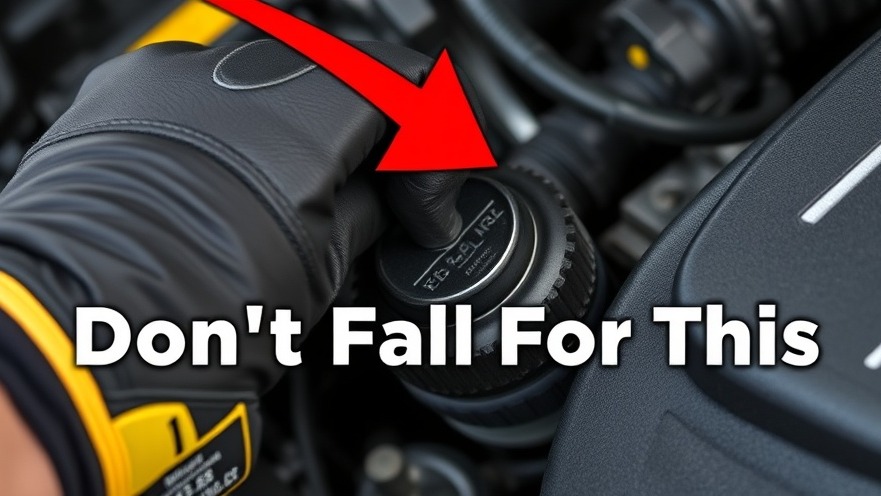
Debunking Common Engine Oil Myths That Cost You Money
When it comes to maintaining your vehicle, engine oil plays a crucial role in ensuring your car runs smoothly. However, many car owners fall prey to myths that can cost them unnecessary expenses or even harm their engines. Understanding the reality behind these misconceptions is key to saving money and extending the life of your car.
In '11 Engine Oil Myths Stupid People Fall For (STOP WASTING MONEY!)', the discussion dives into the common misconceptions about engine oil that many car owners still believe. We’re breaking down its key ideas while adding our own perspective.
The High Cost of Ignoring Engine Oil Myths
Myth number 11: Additives and treatments improve oil performance. Many drivers believe that adding extra chemicals to their oil will enhance its performance, but that's not true. Modern engine oils are designed with balanced additives that achieve optimal performance. Adding more chemicals can actually disrupt this balance, leading to sludge buildup and higher friction, which ultimately results in engine wear. As a rule of thumb, always stick to the recommendations provided in your owner's manual.
Branded Oil vs. Quality Oil: What Matters More?
Myth number 10: You must use the manufacturer's oil brand. While loyal car owners may swear by their manufacturer's brand, the truth is that as long as the oil meets the specified ratings (like API or SAE), your vehicle will function just fine. Manufacturers often package oil from major brands, so you aren't missing out on quality by choosing a different brand. Stick to the specifications for the right viscosity and certification, and you will keep your engine happy.
The Truth About High Mileage Engines and Oil Choices
Myth number 9: Thicker oil is always better for high mileage engines. This advice might seem intuitive, but putting thicker oil in modern engines—constructed with tight tolerances—can cause more harm than good. Instead of switching to a thicker oil, using high-mileage synthetic oil designed to reduce oil burn-off is the better choice. It’s essential to adhere to your manufacturer's viscosity recommendations to ensure proper lubrication.
Why Less Oil Can Cause Big Problems
Myth number 8: Having too much oil in your engine is okay. Too much oil can lead to cavitation, essentially whipping the oil into foam, which inhibits its ability to lubricate. This foaming can damage engine components due to inadequate lubrication. Checking your oil level with a dipstick should be a routine part of your maintenance.
Synthetic Oil Is for Everyone, Not Just Sports Cars
Myth number 7: Synthetic oil is only for high-performance vehicles. The reality is that synthetic oil benefits all types of vehicles because it resists breakdown and performs well in extreme temperatures, resulting in longer intervals between oil changes. It’s a smart investment for any vehicle—to save you money in repairs down the line.
Switching from Synthetic to Conventional Oil: The Truth
Myth number 6: If you switch to synthetic oil, you can never go back. This is false. You can switch back to conventional oil if needed, but it's advisable to follow your manufacturer's recommendations about what oil type works best for your specific model.
Cost-Savings: DIY Oil Changes or Professional Help?
Myth number 5: Changing your own oil saves you money. While changing your oil might seem like a cost-saving measure, many times, it’s more economical to have a professional handle it. They buy oil and filters in bulk and have the right tools for efficient service—saving you time, effort, and possible injury.
Understanding Oil Color: Dark vs. Dirty
Myth number 4: Dark oil equals bad oil. In fact, dark oil simply means it’s doing its job, absorbing dirt and impurities. It’s better to focus on the oil's viscosity and adhere to your specific oil change intervals rather than just color.
The 3,000 Mile Oil Change Myth
Myth number 3: You should change your oil every 3,000 miles. This rule is outdated. Many modern engines can go 5,000 to even 10,000 miles between changes, depending on manufacturer recommendations, reducing hassle and waste.
Worn Seals and Synthetic Oil: Separating Fact from Fear
Myth number 2: Synthetic oil causes leaks. Issues arise when switching to synthetic oil due to worn seals, not because of the oil itself. Synthetic oils may flow more easily but do not create leaks if the seals are in good condition.
Don't Neglect Your Oil Filter
Finally, myth number 1: Oil filters don't need to be replaced every oil change. This is a crucial maintenance step; keeping an old filter can restrict oil flow and damage your engine. Regularly changing your oil filter is just as important as changing the oil itself.
In summary, understanding the myths surrounding engine oil can prevent costly mistakes and enhance your vehicle's performance. Invest time in learning about the right oils and maintenance practices to get the most out of your vehicle.
If you want to ensure the longevity of your car and maximize your investment, consider discussing your engine oil needs with a professional and adhere strictly to manufacturer recommendations.
 Add Row
Add Row  Add
Add 




Write A Comment